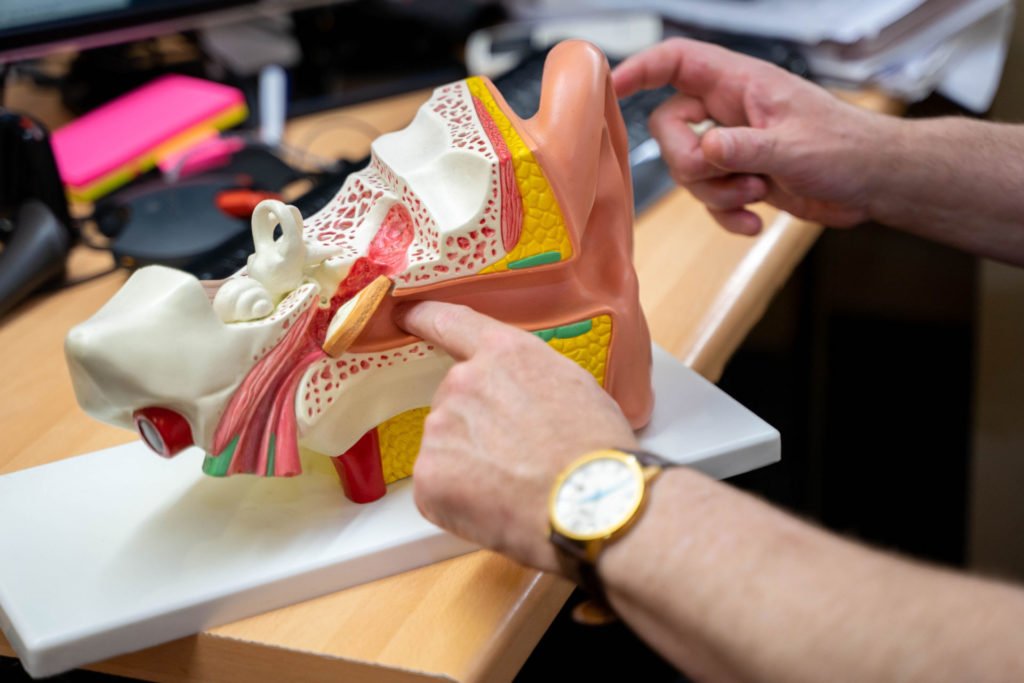Is there a connection between hearing loss and dementia?
As we grow older we commonly face more health problems. Today we are exploring whether dementia, can also be caused by hearing loss.

As we grow older we commonly face more health problems. One of the most common disabilities that occur through age is hearing loss, this is due to the loss of tiny hair cells which help sound travel through our ears. We lose these cells naturally as we age. This is why we begin to struggle with hearing. Today we are exploring whether other health problems, such as dementia, can also be caused by hearing loss.

What is dementia?
Dementia is a cognitive disease which currently effects 55 million people across the world. This number is expected to grow as life expectancy increases. Currently, there is no cure for dementia – this is due to the way it affects the body, yet there are still ongoing efforts to find one. There are currently 5 different variations of dementia depending on how the brain is affected, these include:
Alzheimer’s Dementia
This is the most common form of dementia found in older adults and is caused by various changes within the brain. Mainly the inconsistent build-ups of proteins which go by the names of plaques and tau tangles. As these proteins build up they can clump together and damage nerve cells within the frontal lobe of the brain. This area of the brain takes responsibility for your higher cognitive functions including memory.
This is why people affected by Alzheimer’s often begin to struggle with remembering familiar words or locations of their possessions. As the condition progresses people can be found struggling to remember larger memories including family members, friends, the location of their house and other large memories from their life.
Frontotemporal Demetia (FTD)
This form of dementia is much rarer and can occur in people younger than 60. Much like Alzheimer’s, the cause is due to build-ups of protein within the frontal lobe area, in addition to unusual amounts of TDP-43.
Rather than just affecting the memory of the person this condition can affect the way a person behaves. Therefore, it can be difficult to initially diagnose someone with FTD as symptoms vary depending on the host. Those close to the person may misinterpret sudden outbursts or conflict as an act of aggression as they do not understand the affected person is not in control of their actions.
Speech and movement are commonly the most affected areas cognitively for a person with FTD. Early stages can include impulsive actions such as speaking inappropriately or repeating the same task over again. Movement can feel stiff and slow, which can also lead to difficulty in swallowing food. During later stages of FTD memory can also be affected much like Alzheimer’s since the same area of the brain is affected.
Lewy Body Dementia (LBD)
LBD is currently one of the most common forms of dementia affecting over 1 million people in the United States. Lewy Body Dementia is caused by anomalous deposits of alpha-synuclein in the brain. This type of protein can affect movement, behaviour and mood when built up inside the brain.
Much like other forms of dementia, this is a progressive disease, meaning the symptoms will worsen over time. Rather than affecting memory LBD mainly affects a person’s thinking ability. Those diagnosed with LBD will often have visual hallucinations, affecting what they believe to be there and what is not actually there. They also smell things which are not present at the current time.
A person may seem very disorganised and have a lack of attention/alertness throughout the day. As symptoms progress a person may find their memory beginning to get affected as they make decisions in poor judgement and confusion.
Movement can also be affected through time. This may begin as some stiffness in the muscles and then develop into balance problems and potential falls.
Vascular Dementia
Vascular dementia is also a more common form of dementia affecting around 150,000 people in the UK. Rather than occurring through unusual build-ups of protein, vascular dementia forms through reduced blood flow to the brain. It is common for people with underlying health conditions, such as high blood pressure and diabetes to be affected by this variant of dementia.
Vascular dementia commonly forms through a blocked or narrowing blood vessel in the brain. Strokes can act as a catalyst for vascular dementia to form as they can damage the brain and blood vessels. A single stroke could be enough for vascular dementia to develop or a series of mini-strokes which build up damage over time.
Symptoms of vascular dementia worsen over time, a person may find their cognitive functions affected through this form of dementia. Beginning with slight difficulties through thinking and concentrating can then build into getting confused and unable to keep balance when walking.
Mixed dementia
Mixed dementia is a mix of at least two or three other forms of dementia. It is most commonly a mix of Alzheimer’s, Vascular and Lewy bodies. Currently, the number of people who have mixed dementia is unknown due to the difficulty in diagnosis.
Doctors want to bring more awareness to mixed dementia as the symptoms are mixed through other dementias. Therefore, it can be hard to differentiate each variant and diagnose someone with mixed dementia. Symptoms can include slow movement, impulsive actions, difficulty concentrating, muscle stiffness, and others listed above.
There is currently no cure and no known treatments to help with mixed dementia. Scientists hope to find out more information in the future to try and produce treatments to help people with mixed dementia as it can impact the brain the most.

Symptoms of hearing loss
Hearing loss often occurs in older adults yet younger people can be affected if they often listen to loud music, have diabetes or have high blood pressure. Hearing loss symptoms often range from:
- Muffled speech
- Difficulty understanding speech and certain words in loud environments
- Struggle to hear consonants
- Frequently turning the volume up on TV or other devices
- Often having to ask others to repeat themselves
Hearing loss can affect people’s ability to socialise as they may not feel confident in social spaces where they have difficulty hearing. There are now technologies such as hearing aids to help aid people with hearing loss. Moreover, hearing loss can sometimes be caused due to a blockage of ear wax inside the ear canal. Ear wax removal can act as a remedy for hearing loss and any other ear irritation as well. We offer ear wax removal at all our clinics across North London, click the link to find out more.
How are dementia and hearing loss linked?
Although the connection between hearing loss and dementia has not been fully identified, many studies have found those suffering from hearing loss have a greater chance of developing dementia.
Whenever we hear sounds our brain subconsciously processes the sounds to identify our surroundings and what is happening around us. Hearing loss can add a lot of strain to the brain’s subconscious, as it is much harder to process sounds and information.
After a long period of time, overstimulation can lead to neurons becoming damaged.
Once neurons are damaged, dementia can begin to develop, and cognitive functions become increasingly difficult.
Strokes and seizures can become common when neurons do not function correctly, which could potentially lead to vascular dementia. As previously mentioned vascular dementia can arise from strokes, this is due to reduced blood flow to the brain as the blood vessels become narrow.
Although the link between hearing loss and dementia has not been fully recognised, there’s an adequate amount of evidence to support the theory of a link between the two illnesses. Therefore, it is still recommended to look after your hearing as you age.
Preventing hearing loss
There are a number of changes you can make to prevent hearing loss in your ears such as:
- Do not listen to music at a high level of volume – especially in earphones or headphones
- Turn down the volume on your TV, you should be able to hear people talking around you.
- Wear ear protection when exposed to loud levels of noise
- Stop/cut down on smoking
- Stop /cut down on vaping
- Lower alcohol intake
If you have any concerns about your hearing we recommend you come in for a hearing test as soon as possible. We can help you find a solution to your hearing and help answer any questions you may have. Click the link above to learn more about our hearing tests or you can book an appointment here. Or if you would prefer, you can ring our number at 0800 781 0422.

